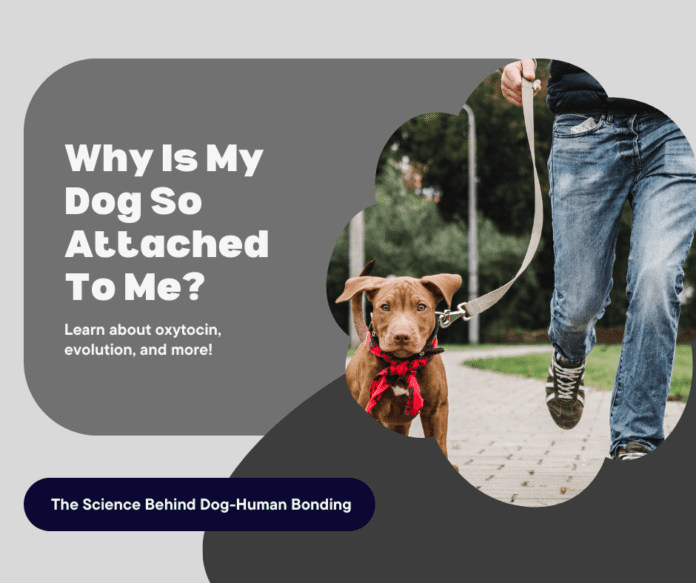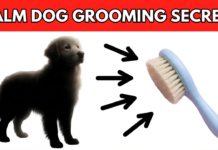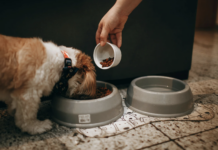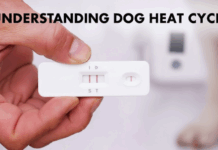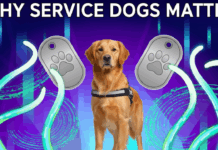Last Updated on January 24, 2024 by Dog Lover
Why Is My Dog So Attached to Me? The Science Behind the Bond
Have you ever glanced at your dog sprawled contentedly at your feet, tail thumping a rhythmic beat against the floor, and wondered what fuels their unwavering devotion?While instinct undoubtedly plays a role, the human-canine bond transcends mere survival needs. It’s a tapestry woven from biology, evolution, and mutual affection, creating a connection unlike any other.
Firstly, let’s rewind the clock to the dawn of domestication. Wolves, our canine ancestors, possessed an inherent social nature, living in cooperative packs.
Over millennia, those wolves exhibiting friendliness and tolerance towards humans thrived, laying the foundation for what we now call dogs. This selective breeding instilled in dogs a predisposition to forge bonds with humans, seeking security and companionship within our social structures.Modern science sheds light on the biochemical undercurrents of this attachment. When we interact with our dogs, both our brains release oxytocin, the “love hormone.” This surge fosters feelings of trust, calm, and contentment, reinforcing the positive cycle of affection.
Studies even suggest that dogs can gaze longingly into our eyes, triggering the same oxytocin release that occurs between mothers and infants, highlighting the depth of their emotional connection.
Beyond hormones, dogs possess an uncanny ability to read our emotional cues. They readily pick up on subtle variations in our voice, posture, and facial expressions, mirroring our emotions with uncanny accuracy.
This emotional attunement allows them to offer comfort and support when we’re feeling down, further strengthening the bond built on mutual understanding.
Our daily routines also play a crucial role. From morning walks to shared mealtimes, the predictability and structure we provide become anchors for our furry companions.They thrive on knowing what to expect, and these shared experiences further cement the sense of belonging and security they derive from our presence.
In conclusion, the reasons why your dog is so attached to you are numerous and multifaceted. It’s a blend of evolutionary predisposition, hormonal responses, emotional sensitivity, and the shared routines that create a sense of stability and love.
So, the next time your dog showers you with sloppy kisses and wagging tails, remember, it’s not just instinct; it’s a profound connection forged over millennia, a testament to the enduring love between humans and their canine companions.
The Power of Oxytocin
One of the key factors that contribute to the strong bond between dogs and humans is the release of oxytocin. Often referred to as the “love hormone,” oxytocin is responsible for creating feelings of trust, love, and attachment.
When you interact with your dog through petting, cuddling, or even just making eye contact, both you and your dog experience a surge of oxytocin, strengthening your bond.
Evolutionary History
Humans and dogs have shared a long and intertwined history. Dating back thousands of years, dogs were domesticated from wolves and became our loyal companions. This co-evolutionary journey has shaped the bond we have today.
Dogs have adapted to understand human communication cues and emotions, making them highly attuned to our needs and desires. This deep connection is a result of our shared history and the mutual benefits we have gained from each other.

Social Pack Animals
Dogs are social pack animals by nature. In the wild, they form strong bonds within their packs, relying on each other for survival. When dogs become a part of our families, they naturally transfer this pack mentality to their human counterparts.
Your dog sees you as their pack leader and seeks comfort, security, and companionship from you. This is why they constantly want to be by your side, as it gives them a sense of safety and belonging.
Unconditional Love and Loyalty
Dogs are renowned for their unwavering loyalty and unconditional love. They provide us with companionship and emotional support, making them an integral part of our lives.
Dogs have an incredible ability to sense our emotions and provide comfort when we need it the most. Their non-judgmental nature and constant affection create a bond that is difficult to replicate with any other creature.
The Role of Training and Positive Reinforcement
While the natural bond between humans and dogs is strong, training and positive reinforcement play a crucial role in strengthening this bond even further. When you invest time and effort into training your dog, you build trust and establish clear communication.
This not only enhances their obedience but also deepens the bond between you. Positive reinforcement, such as treats and praise, creates a positive association with you, making your dog more attached and eager to please.
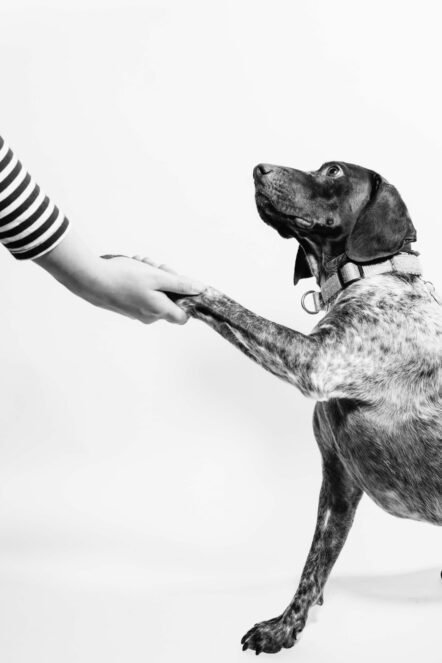
Conclusion
The bond between humans and dogs is a remarkable phenomenon. It is a combination of evolutionary history, the release of oxytocin, and the deep-rooted social nature of dogs. Our furry friends provide us with unconditional love, loyalty, and companionship, making them an invaluable part of our lives.
FAQs
How can I strengthen the bond with my dog?
Building a strong bond with your dog involves spending quality time together, engaging in training exercises, and providing plenty of love and attention.
Can dogs form attachments to multiple people?
Yes, dogs are capable of forming attachments to multiple people. However, the strength of the bond may vary depending on the individual dog and their experiences.
Why does my dog follow me everywhere?
Dogs follow their owners everywhere because they see them as their pack leader and seek security and companionship. It is a natural instinct for them to stay close to their pack.
Can the bond with my dog change over time?
Yes, the bond with your dog can change over time as you both grow and adapt. Continued training, positive reinforcement, and shared experiences can strengthen the bond even further.
Are certain dog breeds more attached to their owners?
While individual dogs may vary, certain breeds, such as Labrador Retrievers and Golden Retrievers, are known for their strong attachment to their owners.
Remember, your dog’s attachment to you is a special and unique bond. Cherish it, nurture it, and enjoy the unconditional love and companionship that your furry friend brings into your life.
Sources:
- “Oxytocin and Canine-Human Bonding: From Affiliation to Trust” by Brian Hare, et al., published in Frontiers in Psychology (2012): https://www.ncbi.nlm.nih.gov/pmc/articles/PMC4078815/
- “The Domestication of the Dog: Its Evolutionary and Behavioral Significance” by Raymond Coppinger and Lorna Coppinger, published in Cambridge University Press (2000): https://www.amazon.com/Dogs-Startling-Understanding-Behavior-Evolution/dp/0684855305
- “How Dogs Read Our Emotions” by Alexandra Horowitz, published in Scientific American (2019): https://www.scientificamerican.com/podcast/episode/why-your-dog-might-think-you-rsquo-re-a-bonehead/
